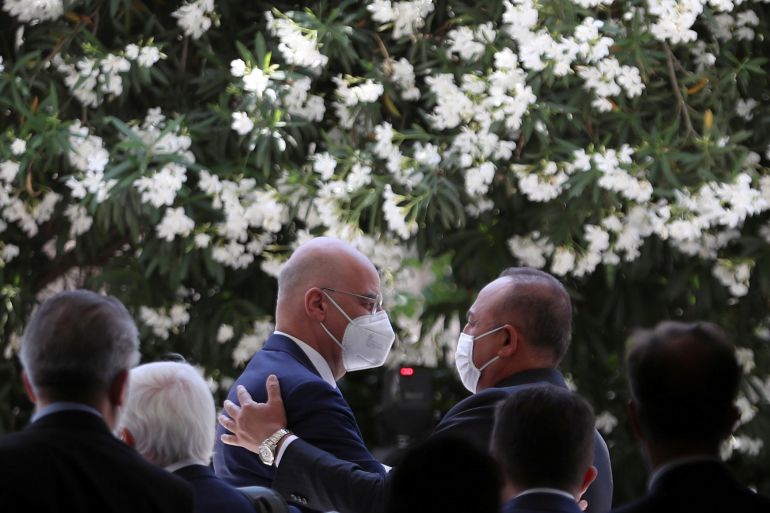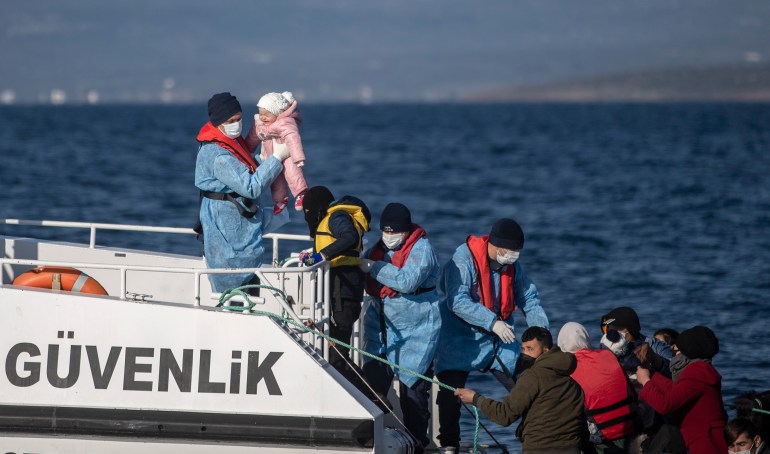Turkey, Greece look for calm Eastern Mediterranean summer

Nearly a year ago, the Eastern Mediterranean was simmering with disputes over maritime borders between historic rivals Greece and Turkey.
Fresh off recent military advances in Libya, Ankara dispatched drilling vessels to contested waters in the Mediterranean, while Greece mobilised support from Turkey’s regional rivals – Egypt, France and the United Arab Emirates – to push back on what it saw as Turkish excursions into its lawful waters.
Keep reading
list of 4 itemsWhat is behind the Eastern Mediterranean oil and gas rush?
Erdogan raises rhetoric in Greece standoff in Mediterranean
Turkey open to Mediterranean Sea talks but ‘determined’: Erdogan
As tensions rose, a military buildup ensued in the Mediterranean as Greece sent frigates to shadow the Turkish vessels and in August, two warships collided as they tried to pass each other.
In April, the foreign ministers exchanged accusations on a wide range of issues during a volatile press conference in Ankara at the end of their first meeting in more than a year.
Fast forward six weeks and this may explain why both countries are treating the low-key visit of Turkey’s foreign minister to Athens on Monday as a small victory.
“The purpose of our meeting today was to initially attempt to establish common ground and then, if possible, to proceed with the gradual normalisation of the situation in the longer term,” Greek Foreign Minister Nikos Dendias said following a meeting with his Turkish counterpart Mevlut Cavusoglu.
Preventing flare-ups
The countries’ two top diplomats made a concerted effort to prevent any flare-ups over issues such as Cyprus, maritime borders or sovereignty claims during their joint press conference.
“It’s in both states interests to keep the tensions low,” Panayotis Tsakonas, head of the security programme at Athens based think-tank ELIAMEP, told Al Jazeera.
During the height of tensions last summer, Greece lobbied the European Council for sanctions on Turkey and Athens has been eager to emphasise that its disputes with Ankara, whether over migration or maritime rights, are tied to the EU as a whole.
“I had the opportunity to discuss with my friend and counterpart, Mevlut Cavusoglu, all the issues concerning our bilateral relations, but also the EU-Turkey relations,” Dendias said in his opening remarks.
But the European Council, and Germany in particular, has been reluctant to impose sanctions on Turkey, instead focusing on the promise of greater cooperation with Ankara if tensions decrease.
In a nod to Greece’s attempts to garner EU support, Charles Michel, the European Council president. said in an interview on Monday that a positive EU-Turkey agenda will “only be implemented if there is progress in different areas”, especially Greek-Turkish relations.
The European Council is set to meet in June and will discuss its relationship with Turkey.

Updating deals
Ankara wants the EU to update the customs union agreement it has with the bloc and asked for a more liberal visa policy for Turkish citizens.
In 2020, Turkey was the EU’s sixth-largest trade partner with total trade in goods of 132.4 billion euros ($161bn).
While technically still a contender for EU membership, talks on Turkey’s ascension have stalled.
Earlier in May, the European Parliament voted overwhelmingly to end Turkey’s admissions process due to backsliding on human rights and democratic values.
Turkey’s foreign ministry issued a statement rejecting the text and in doing so, partly blamed Greece for the deteriorating relations.
“[It] reflects the completely unfair and biased Greek and Greek Cypriot arguments regarding the Aegean, the Eastern Mediterranean and Cyprus issue,” it said.
Tsakanos said Turkey’s restraint in the eastern Mediterranean over the last months and the foreign minister’s visit are a recognition of the poor state of EU-Turkish affairs and high stakes of the upcoming European Council meeting.
“This visit was with an eye on relations with the US and mostly the EU,” he said. “There is an understanding in Turkey that their relationship with the West passes through Athens.”
Although tensions have notably cooled, both sides have limited trust.
Murat Aslan, an analyst with the SETA Foundation, an Ankara-based think-tank seen as close to the Erdogan government, told Al Jazeera: “There is an intense perception in Turkish minds that Greeks are motivated to provoke in order to have Turkey make a fault.”
The main goal of Cavusoglu’s visit on Monday was to prepare the groundwork for a meeting between Greek Prime Minister Kyriakos Mitsotakis and President Recep Tayyip Erdogan on the sidelines of a NATO summit on June 14.
The leaders last met at a NATO gathering in December 2019.
Their tense encounter came a month after the announcement of the Turkey-Libya maritime agreement that Athens claims is illegitimate under the UN Conventions on the Law of the Sea for disregarding Greek rights to exclusive economic zones via islands in the Mediterranean.
Mitsotakis-Erdogan summit
Aslan said the upcoming meeting will in part be affected by how Mitsotakis receives Erdogan and pressure from Greece’s partners.
“The US and EU have been the determinant in Greek strategy. If they encourage Greek leadership to de-escalate, Mitsotakis should be expected to be more moderate,” he said.
On Monday, both sides appeared more willing to focus on positive aspects of the bilateral relationship.
They announced steps about 25 articles to improve economic ties and said they would mutually recognise each country’s COVID-19 vaccination certificate to improve travel.
Both Greece and Turkey are looking for the summer of 2021 to re-start their battered tourism sectors.
Tourism accounts for about 20 percent of Greece’s GDP and directly employs one in five Greeks, while in Turkey it is a crucial source of foreign currency.
The Turkish economy has come under increasing pressure the last few months and Erdogan recently purged a second high-profile official at the country’s central bank.
Last week, the Turkish lira hit its lowest level to the dollar on record.
Asked about the pressure Turkey is under economically and how this may impact tensions with Greece going into the summer Aslan said: “Erdogan does not have a personality to sacrifice national interest for the value of the Turkish lira.”